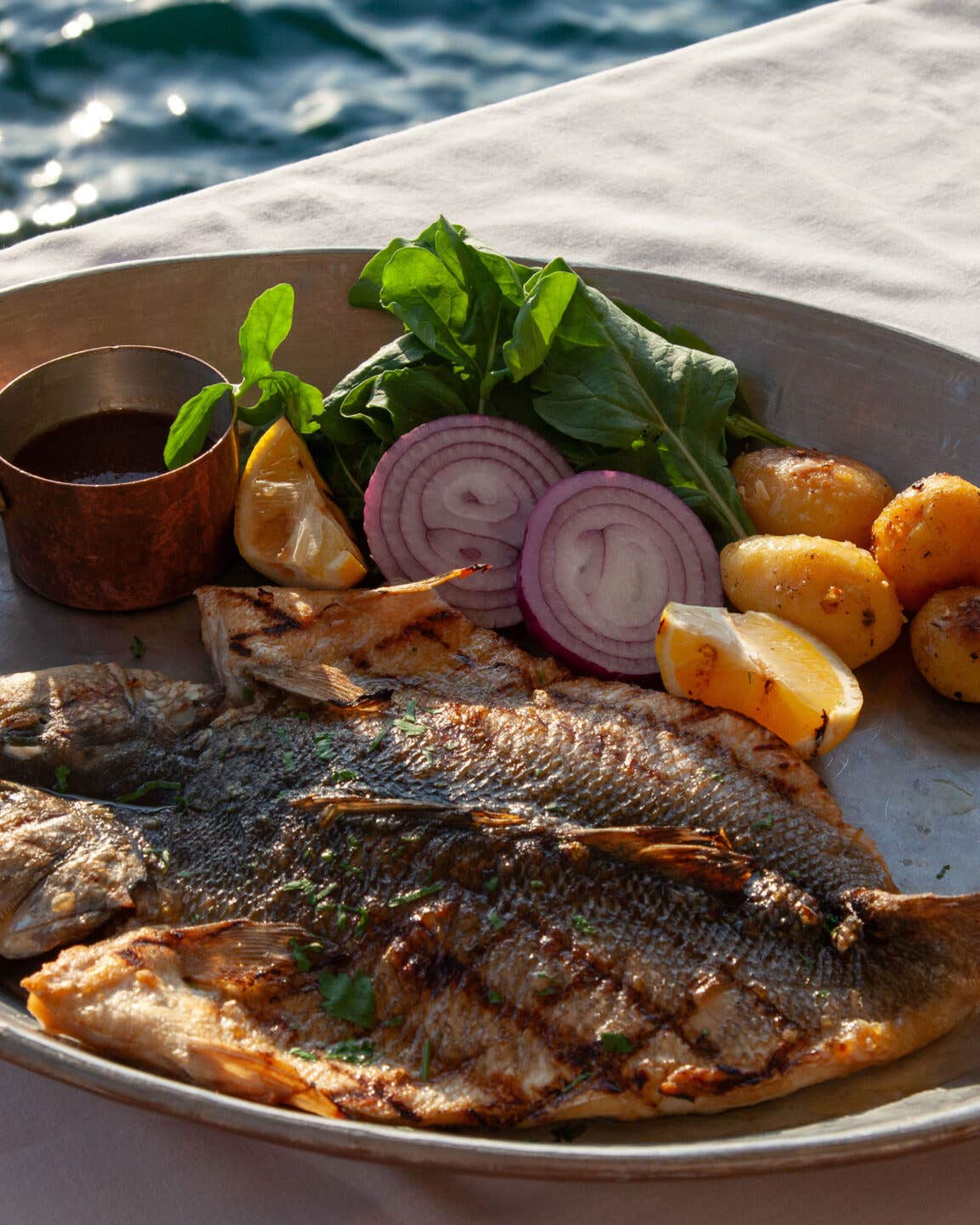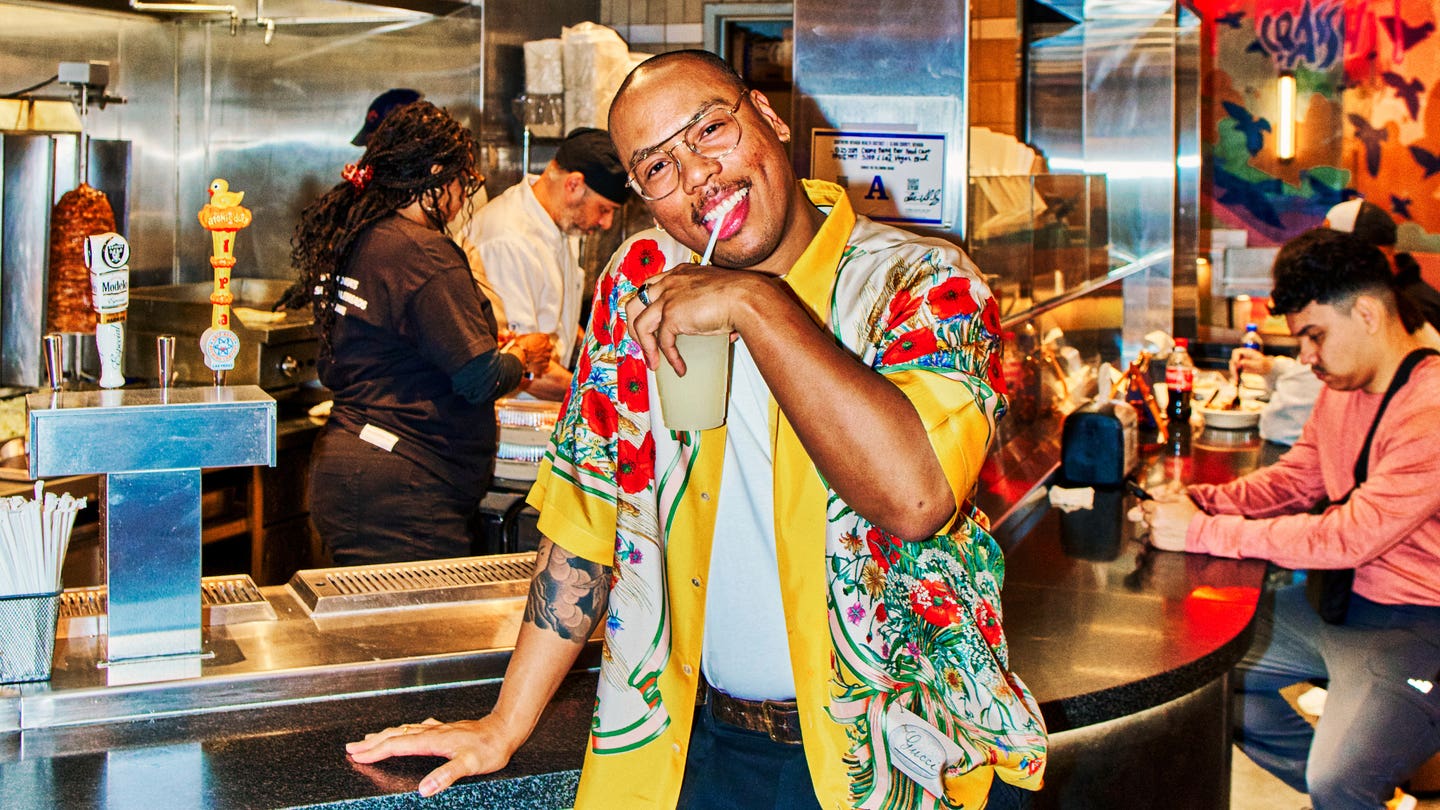
Kentucky Home
Early on a cool, misty November morning in a tidy little house deep in the hills of Kentucky's Cumberland Mountains, a woman stands in front of her stove. She is small and compact, her gray hair coiled into a neat bun. She is wearing a long blue dress sprinkled with flowers and an embroidered white apron. Steam rises from pots, and their lids jangle. She opens the oven door and bends over and a rush of warm air filled with the smell of corn bread rises up to meet her. Lightly touching the bread's golden top, she judges it ready. Outside on the porch, a man dressed in clean blue overalls and a checked flannel shirt sits in a chair, rocking quietly, as if even at this hour—it's barely 7:00 a.m.—he thought someone might walk up the path that leads to the house. It is Thanksgiving morning, and Rena and William McClure are expecting their 13 children and their families to come home for dinner.
Rockcastle County, in southeastern Kentucky, is gorgeous, rugged country. Heavily forested, with narrow, steep-walled valleys, huge boulders, and swift-flowing creeks, the terrain is difficult to traverse. The coal mines of Harlan are 80 miles to the southeast, deep in the Appalachians. Good farmland lies to the north—the state's famed bluegrass country. Rockcastle has limestone quarries and small farms where tobacco is raised as a cash crop. Though rich in natural beauty, it has traditionally been a hard place to eke out a living; for much of its history, people here just "got by".
In the 18th century, the area was settled by the Scotch-Irish—Scottish lowlanders who migrated first to Northern Ireland and then on to America. Those resourceful, self-reliant people played a large part in settling the American wilderness, and their values and work ethic helped build the foundations of this country. The discovery of the Cumberland Gap in 1750 opened up a route through the Appalachians. Even before Daniel Boone, Henry Skaggs explored Kentucky in 1763. Following rivers and creeks, he found his way through the mountainous region. His trail—Skaggs Trace—passes just in front of the McClures' home.
It was to this pretty piece of land, in the hollow below a steep ridge, that the newly married McClures moved in 1946. Both their families had settled the surrounding hills late in the 18th century, and Rena Cromer and William McClure had grown up across from each other on Skaggs Creek in McClure Branch, only a mile away from where they started their married life. They moved into a 200-year-old log house with two rooms divided by a breezeway. It was rustically beautiful but primitive—no running water, no electricity, no phones. The Blue Springs General Store, where they bought cornmeal, flour, coffee, and sugar, was three miles away, and with no car they had a long walk.
They raised the "bigger part", says Rena, of all they needed in two large gardens planted with corn, beans, squash, tomatoes, cucumbers, bell peppers, and both Irish and sweet potatoes. Using mules to plow the ground, they hand-hoed the weeds. Chickens were kept for eggs and for stewing or frying and hogs for butchering—their meat smoked and sugar-cured into fine hams, their fat turned into lard. Cows were milked by hand. Cream was churned into butter, and gallon jugs of milk and buttermilk were submerged in the cold spring to keep them cool.
Over the years the family grew, and they had 13 children—Betty Lou, Gerold, Alene, Roger, Jerry, Faye, Judy, Wayne, Bobby, Dennis, Tim, Sheryl, and Randy. The house bulged. One room doubled up as a living room-bedroom with a loft where four of the boys slept. Eventually the breezeway was turned into sleeping quarters. But the heart of the house was the second room—the kitchen—with a big black cast-iron wood-burning cookstove and a long homemade pine table with enough benches and chairs to seat the whole family.
Rena rose every morning before dawn. "We worked daylight to dark. On winter mornings, I had to put on a coat and overshoes to go into the kitchen to build up the fire for the cookstove," she remembers. "I made oats, biscuits, sausages and bacon, eggs, and coffee. Oh, and corn bread, always corn bread." On Sundays she would make breakfast and cook lunch before they started on the three-mile trek to the Church of Christ in Blue Springs. The older children walked, and Rena and William each carried a little one. "We'd come back home to eat; then in the afternoon we'd walk the three miles over to the Sinks [community] to another church service. It was where my grandpa went, and it was a chance to see him. I loved Sundays," Rena says.
While the rest of the country zoomed forward into prosperity and the push-button age, creek beds still served as roads into the 1950s in Rockcastle County. The average property tax in the county was less than $2.00 per year. William paid 50 cents to ride the mail truck—a jolt wagon with no springs—that followed Skaggs Creek ten miles into Mount Vernon, the county seat and nearest town. "That horse sure did bounce me up and down," William says. "I had to get under the tarp to stay out of the bad weather. When the road was built in '54, it sure eased us a bit. Then electricity came, in July of '59."
To help support the family, William "rived boards", making as many as 1,500 shingles a day. Gentle, soft-spoken, and with an honest, unflinching gaze, he came to be a leader in the community. He recalls that when the county's spring water grew scarce and, in some areas, sulfurous, Buzz Carloftis, judge of Rockcastle County, took William and other locals to Frankfort to speak with Governor [Brereton C.] Jones. "Now, that water smelled like a rotten egg, and a whole lot of people relied on that water. We left before dawn to get there early, but we waited outside his office for over seven hours. It was evening when he saw us." After William and the others had pled their case, it was evident that, because of the lateness of the day and the small size of the rural community, their problem would not be made a top priority. William stood to leave. Shaking the governor's hand, he said quietly, "Good-bye, and thank you for your time. If you can't help us, then think of us." The governor called Judge Carloftis the next day and doubled the amount that the citizens of Rockcastle were asking for. The water problem was solved, and now the former governor and his wife, Libby, show up regularly as guests at the McClure table.
These days it's easy to get to the McClure place. From Mount Vernon, take a left across the railroad tracks and head out Highway 1249. The road follows the ridges, winding through thickly forested hills. Mistletoe hangs high in the branches of the trees, and as the road slides around corners, the view opens up into small, lush valleys. Quarries show their chiseled faces. Barns painted black to hold the heat are hung with sheaves of curing tobacco. Cows graze in the fields, and flocks of wild turkeys peck under the bushes by the side of the road. Apart from the occasional trailer parked by an abandoned house with a yard full of old cars, the landscape is breathtakingly unspoiled.
Since 1966 the McClures have lived in a modest but modern home that they built next to their old log house. William made the kitchen cabinets out of walnut from trees on the farm. "They come right out of the woods," he states proudly. Water pours from the faucet at the turn of the tap. The electric stove heats in a minute. The kitchen is cozy, the coffeepot always full. On the cluttered kitchen counter a police scanner squawks out the latest local laenforcement activities. It doesn't seem to interrupt Rena's quiet and peaceful puttering; she likes to listen. "We'll know when they're getting close, so we can run out the back and up the holler," she says, laughing. "You know they call them the good ol' days, but I call them the hard ol' days." Her eyes twinkle. She's happy in her "new" kitchen.
The day before Thanksgiving, Rena made pie dough. She still does it the way her mother, her grandmother, and many other grandmothers did before her—by "gathering the flour into the fat". Standing with a big green plastic bowl of flour resting on her hip, she adds a handful of Crisco and begins working the dough. Then she drizzles in cold milk from a pint canning jar. She doesn't measure; she has performed this rite a thousand times, and she can just feel when it's ready.
Now, sitting at the table, she peels a big bowlful of apples, their skins falling off into long curling green ribbons. She assembles the pie and then puts it into a low oven, so that the apples can cook slowly and the crust won't burn.
William heads out to a small storehouse built up against the ridge. He unlocks the door and steps inside. Floor-to-ceiling shelves are stacked with quart jars of fried apples in wild raspberry syrup, pickled green tomatoes, stewed rhubarb, canned tomatoes, cucumbers, apple jelly, bread-and-butter pickles, pickled salted hot peppers, greasy beans (plump string beans with slick pods), green tomatoes in brine, relish, summer squash, canned peaches, sauerkraut, and sorghum molasses; burlap bags of red potatoes sit on the floor. He grabs some cucumbers and pickles and walks back to the kitchen. Pouring himself a cup of coffee, he says to Rena, "Let's listen to the boys." They slip the little cassette made by their sons Dennis and Roger into a boom box in a far corner of the kitchen. William stands expectant, one hand resting on the back of a chair for balance, the other holding his coffee cup. Rena leans against the kitchen counter. The scanner is turned off, and the quiet of the kitchen is filled with the brothers' voices singing
a cappella in pure harmony. "Were you there when they crucified my Lord?" they sing. When they get to the line "Oh! Sometimes it causes me to tremble, tremble, tremble," their voices swelling with each "tremble", William closes his eyes.
It's close to noon on Thanksgiving, and Rena runs like a teenage girl to answer the phone. Again and again it rings. "We'll be a little late." "I'm bringing chicken and dumplings." All but one of her children live less than an hour away. She keeps cooking, tasting as she goes: "Mmm-hmmm," she says with approval. Then a thought seizes her, and she picks up a large white conch shell with a lustrous pink lining from a living-room shelf.
Standing on the porch, she puts it to her lips and blows out a forlorn, moaning whistle. "This shell came from William's great-great-grandma. They used it to call the boys in from the fields to dinner." By magic or coincidence, just as the sound dies away, daughter Faye McClure's car pulls off the road and stops in front of the house. Faye gets out, carrying a gingerbread cake. As she heads up the path, her mother waits on the porch, holding her hands out to her daughter in a timeless gesture. They hug and head inside right to the kitchen.
Soon the yard is full of families arriving, and the kitchen table loads up with food: roast turkey with sage, corn bread and sausage dressing, country ham, chicken and dumplings, shuck beans with ham hocks, greasy beans, black-eyed peas, mashed potatoes, sweet potato casserole, creamed corn, broccoli casserole, coleslaw, corn bread, rolls, biscuits, applesauce, cranberry sauce, pickles, apple pie, pumpkin pie, pecan pie, butterfinger cake, gingerbread cake, apple pound cake. The family won't all fit at the table, so some sit where they can in the living room or out on the porch, and some stand in the kitchen—it doesn't matter, because they're all together.
"We had a unique upbringing," says Betty Lou Thomas, the eldest of the McClure children. "We girls helped our mother in the house, and the boys helped Daddy outside. We worked in the garden and picked wild blackberries for jam and syrup. We had June apple trees, and we would all sit on the porch or in the kitchen peeling those apples to make apple butter, fried apples pies, or canned apples. Later in the summer Daddy would lay a big white sheet on the ground and pile up the beans as high as our heads. We would gather 'round and string those beans all day.
"We didn't think it was special at the time, but when I look back I guess it was. As Dolly Parton says, 'We didn't know we was poor, but I guess we were.' But we sure had lots of love. All but Gerold live right around here, and nearly every Sunday we get together for dinner after church. We gather 'round on the porch at Daddy's house, and we eat and talk and laugh. We just like to be together. It feels right. Thanksgiving is special, but we give thanks every time we all meet. We cherish every moment."
Keep Reading
Continue to Next Story










